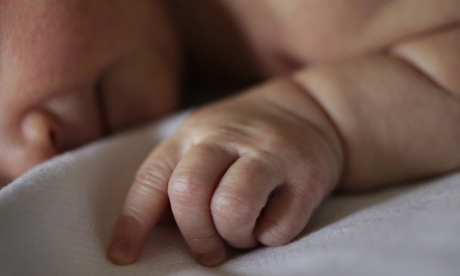The death of his father and birth of his grandson prompted a return to poetry for Joyce – and perhaps his finest work in the medium

'Young life is breathed/ On the glass' … Ecce Puer, a tribute by James Joyce to his grandson. Photograph: Danny Lawson/PA
Bloomsday is 16 June, and what better poem to bring to a celebration of James Joyce's Ulysses, with its son-haunted protagonist Leopold Bloom, than Joyce's powerful lyric, Ecce Puer?
Though a collection of romantic, song-like short poems, Chamber Music (1907), was Joyce's first published book, he soon rejected poetry's sentimental temptations in favour of the objective prose style of Dubliners. Chamber Music, he rightly declared, was a young man's book. There was a later collection, Pomes Penyeach, after which Joyce published only occasional poems; many of them comic or satirical, some touched by a cruder form of the exuberant wordplay associated with his mature fiction. Ecce Puer, written in February 1932, is the outstanding achievement among them.
Literally translated as Behold the Young Boy, Ecce Puer celebrates the birth of Joyce's grandson, Stephen James Joyce, in February 1932, and mourns the death of his father, John Stanislaus Joyce, the previous December. The plea for forgiveness at the end of the poem springs from Joyce's guilt over failing to return from the continent to Ireland when John Joyce lay dying. The writer had drawn much of his literary inspiration from his father, crediting him, in fact, with the paternity of Ulysses: "The humour… is his: its people are his friends. It's his spittin' image," he told Louis Gillet.
More
Though a collection of romantic, song-like short poems, Chamber Music (1907), was Joyce's first published book, he soon rejected poetry's sentimental temptations in favour of the objective prose style of Dubliners. Chamber Music, he rightly declared, was a young man's book. There was a later collection, Pomes Penyeach, after which Joyce published only occasional poems; many of them comic or satirical, some touched by a cruder form of the exuberant wordplay associated with his mature fiction. Ecce Puer, written in February 1932, is the outstanding achievement among them.
Literally translated as Behold the Young Boy, Ecce Puer celebrates the birth of Joyce's grandson, Stephen James Joyce, in February 1932, and mourns the death of his father, John Stanislaus Joyce, the previous December. The plea for forgiveness at the end of the poem springs from Joyce's guilt over failing to return from the continent to Ireland when John Joyce lay dying. The writer had drawn much of his literary inspiration from his father, crediting him, in fact, with the paternity of Ulysses: "The humour… is his: its people are his friends. It's his spittin' image," he told Louis Gillet.
More
No comments:
Post a Comment